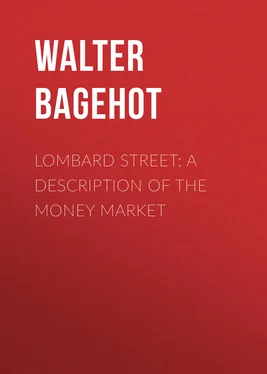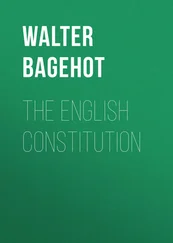Walter Bagehot - Lombard Street - A Description of the Money Market
Здесь есть возможность читать онлайн «Walter Bagehot - Lombard Street - A Description of the Money Market» — ознакомительный отрывок электронной книги совершенно бесплатно, а после прочтения отрывка купить полную версию. В некоторых случаях можно слушать аудио, скачать через торрент в формате fb2 и присутствует краткое содержание. Жанр: foreign_prose, История, foreign_edu, foreign_antique, на английском языке. Описание произведения, (предисловие) а так же отзывы посетителей доступны на портале библиотеки ЛибКат.
- Название:Lombard Street: A Description of the Money Market
- Автор:
- Жанр:
- Год:неизвестен
- ISBN:нет данных
- Рейтинг книги:4 / 5. Голосов: 1
-
Избранное:Добавить в избранное
- Отзывы:
-
Ваша оценка:
- 80
- 1
- 2
- 3
- 4
- 5
Lombard Street: A Description of the Money Market: краткое содержание, описание и аннотация
Предлагаем к чтению аннотацию, описание, краткое содержание или предисловие (зависит от того, что написал сам автор книги «Lombard Street: A Description of the Money Market»). Если вы не нашли необходимую информацию о книге — напишите в комментариях, мы постараемся отыскать её.
Lombard Street: A Description of the Money Market — читать онлайн ознакомительный отрывок
Ниже представлен текст книги, разбитый по страницам. Система сохранения места последней прочитанной страницы, позволяет с удобством читать онлайн бесплатно книгу «Lombard Street: A Description of the Money Market», без необходимости каждый раз заново искать на чём Вы остановились. Поставьте закладку, и сможете в любой момент перейти на страницу, на которой закончили чтение.
Интервал:
Закладка:
The main point on which one system of credit differs from another is 'soundness.' Credit means that a certain confidence is given, and a certain trust reposed. Is that trust justified? and is that confidence wise? These are the cardinal questions. To put it more simply—credit is a set of promises to pay; will those promises be kept? Especially in banking, where the 'liabilities,' or promises to pay, are so large, and the time at which to pay them, if exacted, is so short, an instant capacity to meet engagements is the cardinal excellence.
All which a banker wants to pay his creditors is a sufficient supply of the legal tender of the country, no matter what that legal tender may be. Different countries differ in their laws of legal tender, but for the primary purposes of banking these systems are not material. A good system of currency will benefit the country, and a bad system will hurt it. Indirectly, bankers will be benefited or injured with the country in which they live; but practically, and for the purposes of their daily life, they have no need to think, and never do think, on theories of currency. They look at the matter simply. They say 'I am under an obligation to pay such and such sums of legal currency; how much have I in my till, or have I at once under my command, of that currency?' In America, for example, it is quite enough for a banker to hold 'greenbacks,' though the value of these changes as the Government chooses to enlarge or contract the issue. But a practical New York banker has no need to think of the goodness or badness of this system at all; he need only keep enough 'greenbacks' to pay all probable demands, and then he is fairly safe from the risk of failure.
By the law of England the legal tenders are gold and silver coin (the last for small amounts only), and Bank of England notes. But the number of our attainable bank notes is not, like American 'greenbacks,' dependent on the will of the State; it is limited by the provisions of the Act of 1844. That Act separates the Bank of England into two halves. The Issue Department only issues notes, and can only issue 15,000,000 L. on Government securities; for all the rest it must have bullion deposited. Take, for example an account, which may be considered an average specimen of those of the last few years—that for the last week of 1869:
An account pursuant to the Act 7th and 8th Victoria, cap. 32, for the week ending on Wednesday, the 29th day of December, 1869.
ISSUE DEPARTMENT.
Notes issued 33,288,640 L| Government debt 11,015,100 L
| Other securities 3,984,900 L
| Gold coin and bullion 18,288,640 L
| Silver bullion
33,288,640| 33,288,640 L
BANKING DEPARTMENT.
Proprietors' capital 14,553,000 L| Government Securities 13,811,953 L
Rest 3,103,301 L| Other securities 19,781,988 L
Public deposits, | Notes 10,389,690 L
including Exchequer, | Gold and silver coins 907,982 L
Savings' Banks, |
Commissioners of |
National Debt, |
and dividend |
accounts 8,585,215 L|
Other deposits 18,204,607 L|
Seven-day and other |
bills 445,490 L|
44,891,613 L| 44,891,613 L
GEO. FORBES, Chief Cashier.
Dated the 30th December, 1869.
There are here 15,000,000 L. bank notes issued on securities, and 18,288,640 L. represented by bullion. The Bank of England has no power by law to increase the currency in any other manner. It holds the stipulated amount of securities, and for all the rest it must have bullion. This is the 'cast iron' system—the 'hard and fast' line which the opponents of the Act say ruins us, and which the partizans of the Act say saves us. But I have nothing to do with its expediency here. All which is to my purpose is that our paper 'legal tender,' our bank notes, can only be obtained in this manner. If, therefore, an English banker retains a sum of Bank of England notes or coin in due proportion to his liabilities, he has a sufficient amount of the legal tender of this country, and he need not think of anything more.
But here a distinction must be made. It is to be observed that properly speaking we should not include in the 'reserve' of a bank 'legal tenders,' or cash, which the Bank keeps to transact its daily business. That is as much a part of its daily stock-in-trade as its desks or offices; or at any rate, whatever words we may choose to use, we must carefully distinguish between this cash in the till which is wanted every day, and the safety-fund, as we may call it, the special reserve held by the bank to meet extraordinary and unfrequent demands.
What then, subject to this preliminary explanation, is the amount of legal tender held by our bankers against their liabilities? The answer is remarkable, and is the key to our whole system. It may be broadly said that no bank in London or out of it holds any considerable sum in hard cash or legal tender (above what is wanted for its daily business) except the Banking Department of the Bank of England. That department had on the 29th day of December, 1869, liabilities as follows:
Public deposits 8,585,000 L
Private deposits 18,205,000 L
Seven-day and other bills 445,000 L
––
Total 27,235,000 L
and a cash reserve of 11,297,000 L. And this is all the cash reserve, we must carefully remember, which, under the law, the Banking Department of the Bank of England—as we cumbrously call it the Bank of England for banking purposes—possesses. That department can no more multiply or manufacture bank notes than any other bank can multiply them. At that particular day the Bank of England had only 11,297,000 L. in its till against liabilities of nearly three times the amount. It had 'Consols' and other securities which it could offer for sale no doubt, and which, if sold, would augment its supply of bank notes—and the relation of such securities to real cash will be discussed presently; but of real cash, the Bank of England for this purpose—the banking bank—had then so much and no more.
And we may well think this a great deal, if we examine the position of other banks. No other bank holds any amount of substantial importance in its own till beyond what is wanted for daily purposes. All London banks keep their principal reserve on deposit at the Banking Department of the Bank of England. This is by far the easiest and safest place for them to use. The Bank of England thus has the responsibility of taking care of it. The same reasons which make it desirable for a private person to keep a banker make it also desirable for every banker, as respects his reserve, to bank with another banker if he safely can. The custody of very large sums in solid cash entails much care, and some cost; everyone wishes to shift these upon others if he can do so without suffering. Accordingly, the other bankers of London, having perfect confidence in the Bank of England, get that bank to keep their reserve for them.
The London bill brokers do much the same. Indeed, they are only a special sort of bankers who allow daily interest on deposits, and who for most of their money give security. But we have no concern now with these differences of detail. The bill brokers lend most of their money, and deposit the remnant either with the Bank of England or some London banker. That London banker lends what he chooses of it, the rest he leaves at the Bank of England. You always come back to the Bank of England at last. But those who keep immense sums with a banker gain a convenience at the expense of a danger. They are liable to lose them if the bank fail. As all other bankers keep their banking reserve at the Bank of England, they are liable to fail if it fails. They are dependent on the management of the Bank of England in a day of difficulty and at a crisis for the spare money they keep to meet that difficulty and crisis. And in this there is certainly considerable risk. Three times 'Peel's Act' has been suspended because the Banking Department was empty. Before the Act was broken—
Читать дальшеИнтервал:
Закладка:
Похожие книги на «Lombard Street: A Description of the Money Market»
Представляем Вашему вниманию похожие книги на «Lombard Street: A Description of the Money Market» списком для выбора. Мы отобрали схожую по названию и смыслу литературу в надежде предоставить читателям больше вариантов отыскать новые, интересные, ещё непрочитанные произведения.
Обсуждение, отзывы о книге «Lombard Street: A Description of the Money Market» и просто собственные мнения читателей. Оставьте ваши комментарии, напишите, что Вы думаете о произведении, его смысле или главных героях. Укажите что конкретно понравилось, а что нет, и почему Вы так считаете.












